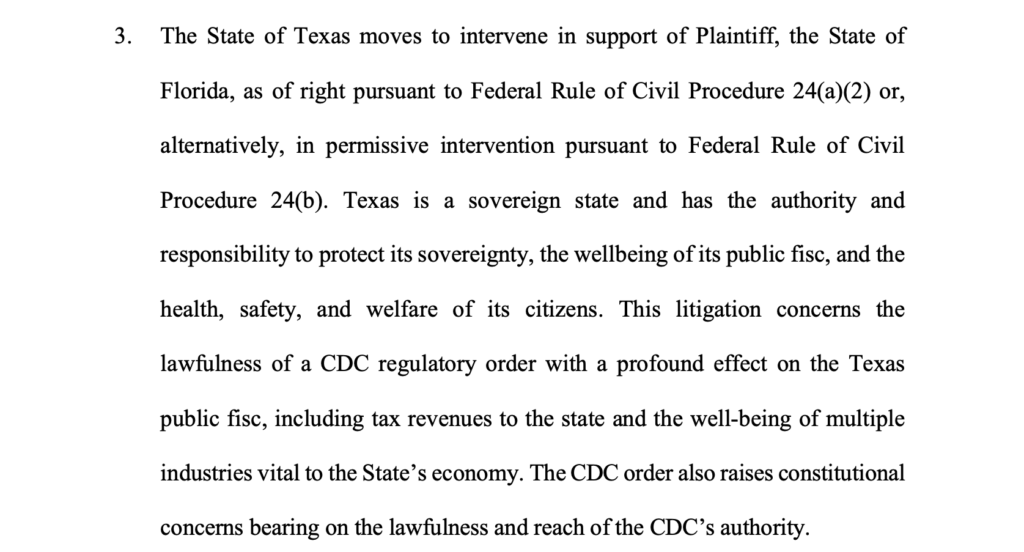Today, the State of Texas filed a motion to intervene in support of the State of Florida vs the CDC. In today‘s filing, the State of Texas states the resulting prolonged economic shutdown has left many people—and, in some cases, entire industries—facing financial ruin. The Center for Disease Control and Prevention has issued a series of “no-sailing” or “conditional-sailing” orders that have brought the Texas passenger cruise industry, and the community of businesses supporting and benefitting from that industry, to a halt.

In 2019, the Port of Galveston, the state’s primary cruise port, had nearly 1.1 million cruise passengers embarked following years of steady growth. Galveston alone accounted for 8% of all US cruise embarkations before the pandemic. In 2018, it is estimated that cruise vitiators spent over $65 million with cruise ships accounting for 47% of the Port of Galveston’s revenue in 2019. This level of operations kept harbor pilots, tugs, and longshoremen operational and employed and as the ripple effect inland, as well. Hotels, restaurants, bars, retail stores, entertainment venues, touring ventures, and airlines all benefit from Texas’ cruise industry. In 2019, tourism-related businesses like travel agencies, airlines, and hotels received some $816 million in direct cruise industry expenditures in Texas.
Texas argues rather than building on the progress health officials have made since the start of this pandemic to allow the cruise industry to operate under reasonable restrictions within its statutory authority, the CDC’s order leaves cruise ships anchored in port while their interests—and those of the many industries that rely on cruise ships sailing—remain at sea.
Texas is not the first state to join in support, on April 20th, Alaska joined in support of Florida.
Today’s move by Texas comes one day after the cruise ship rally in Galveston and on the heels of the CDC’s release of the next phases of the conditional sail order with technical instructions for test cruises.

alaska joining this makes no sense considering canada has their own rules and has nothing to do with the CDC. this whole lawsuit is a joke.
Did you think Alaska is part of Canada?
Princess cruise to Alaska out of Seattle with a stop in Victoria, B.C. to met PVSA requirements. Very much a CDC matter.
Scott…I’m confused with these new orders. Which is your read on it – Can the ships sail mid July if they are 98% crew & 95% passenger vaccinated, or do they now have to follow these new rules and do test cruises? Or can the cruise lines choose which they want to do? I’ve read through it 3 times now and I just can’t seem to get it. Thanks!
The CDC did not lay out a clear path once again. So, it is up to each line’s interpretation and decision on how to progress forward until the goal posts are moved again.
Ok, I’m not crazy then-LOL. Thanks.
Well Alaska should talk, try going there by air for business right now. Go look at their state rules for quarantining etc. Same for Canada, they are VERY strict. They do not allow same day entry and exit without proof of vaccination AND negative testing, AND you must quarantine for at least three days. That’s just for air entry. Canada is indeed its own country and ALL US cruise lines are at the mercy of the one foreign country port they must visit. This lawsuit is ridiculous. Our CDC has no control over the Bahamas, Canada etc.
I was actually hoping this day would come someday. Foreign ship registration to avoid US law and protections for passengers, even though they happily take our US dollars, but then now states sue to get US shackles lifted. Talking about wanting to have cake and eat it too.